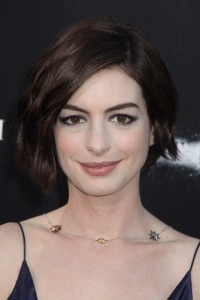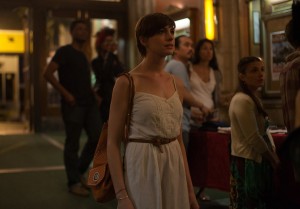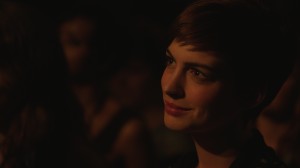By: Izumi Hasegawa February 4, 2015

Oscar-winning actress Anne Hathaway is wearing a new hat: “producer.” Her first film as producer, Song One, which she also stars in is about second chances and music. Why was she attracted to this project? How long has she been thinking about becoming a producer and why? And what did she learn from producing a film with her own hands? I got all the answers!
 Q: What made you say you wanted to get involved with this project?
Q: What made you say you wanted to get involved with this project?
I thought the universal appeal to me, and when I say universal I might only be speaking to a specific portion of the universe, but for me the movie manages to capture something that sounds so icky and new age-y to say out loud, which is the healing power of music, and that’s something I’m very interested in and believe in. Like I said, it’s really cheesy to actually state, so it’s much better to explore it in a film [laughs]. I really loved that. I really love stories about second chances, I love characters who make mistakes and are able to grow from them, and Franny makes a really big one. Right within the first five minutes of knowing her, you see her realize that she was absolutely 100% wrong and then spends the rest of the movie trying to make amends for that. I really liked that. When I read it for the first time, there was this huge question mark over the whole thing, which was, “What is this music going to be and who on earth is going to be able to sing it and be able to act it?” And my husband and Kate and Thomas, her husband, spent the next few years trying to answer those questions.

Q: In the movie, there is a scene where you guys are dating. How was the dating and at the same time you have to be an actress, fans approach you to take photos or signs? Could you talk about how the scene reminds you of your life?
Yeah, the difference between my life and the scene is that in my life I have been both the person crying and that then the fan approaches and this one Franny became invisible. But I’ve had experiences where I’ve been in a tearful conversation and someone comes up and asks if you will take a selfie with them and it’s just kind of the world we live in. Nobody means anything by it. It’s actually flattering if you really think about it. People just want to reach out and that’s just a particular side of my life.
 Q: How long have you been thinking about being a producer? What did you discover being the producer and being in the film?
Q: How long have you been thinking about being a producer? What did you discover being the producer and being in the film?
So one of the reasons why I’m sitting here is because when I was sixteen years old, I started working with a woman named Suzan Bymel and she has been my manager since then. She has represented me every single day since I was 16 years old and she started talking to me after The Devil Wears Prada when my career started to hit a new level. She started to talk to me about actresses that had produced their own material and that I should start thinking about that and not that I should do it necessarily but just start to think about it, look for books that we can maybe option. And I was very open with her. I said, “I totally get the wisdom of what you’re talking about, but I feel like I have so far to go as an actress that I really need to let that be my focus.” I’m not necessarily good at focusing on a few things at the same time while I’m working. I can do it in my life, but when I’m working, I just like to focus on one thing. So it took many, many years, but in the past few years I have started to look at material to produce. This particular project came to me and my husband because Jonathan Demme had worked on the script for two years with Kate (Barker-Froyland, director/writer) and thought Adam (Shulman, producer for this film and Hathaway’s husband) and I would be a good fit to produce it. So that was from him. I like producing. I think that was one of the big surprises. I have a better sense of the kind of producer I am. I’m somebody who likes to go out and find content and match it up with the right filmmaker and screenwriter, but once it becomes time to do the day to day production, I like to be an actor. Kind of the same thing when I was younger, I don’t like to wear both hats. I don’t like to split my focus. Luckily on this particular movie, I was working with a team of producers, so they awarded me that freedom to just focus on the acting. Another thing I learned as a producer is stuff doesn’t magically happen on a film set the way I thought it did. When you’re an actor, you say, “Oh, I’m playing an astronaut. I would like to speak to an astronaut.” The producer goes, “Okay, great. Here’s the astronaut that you can speak to. Do you need me to set a time for you?” and you’re like, “Oh, great. Thank you. That would be nice.” You’re so spoiled as an actor. So many people do so much work to get you where you need to go. I thought I had an appreciation of that but after producing I really, really appreciate the incredible producers that I have worked with over the years and how much work they have to do to just get a day on a film set completed.
Song One opens in theaters January 23rd.
